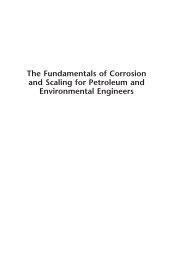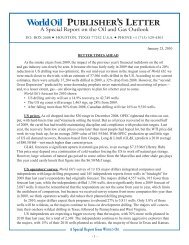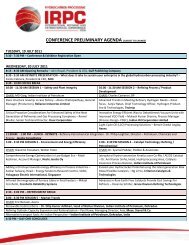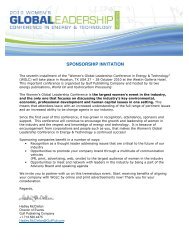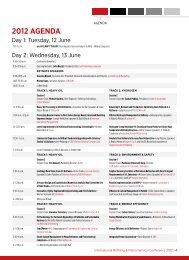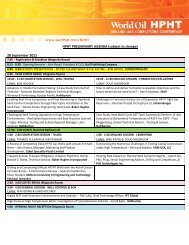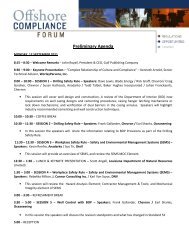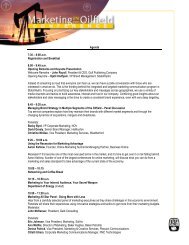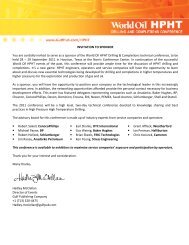The Petroleum Engineering Handbook - Gulf Publishing Company
The Petroleum Engineering Handbook - Gulf Publishing Company
The Petroleum Engineering Handbook - Gulf Publishing Company
You also want an ePaper? Increase the reach of your titles
YUMPU automatically turns print PDFs into web optimized ePapers that Google loves.
Preface xiii<br />
of “blue sky”, i.e. fundamental, science, tackling the justifications for various engineering practices to show<br />
exactly which practices are responsible for which effects and thus how simple it would be to remedy those<br />
practices to come up with solutions that are starkly different from the ones previously being practiced.<br />
This book is not meant to frighten the reader. It does not lecture; it does not indoctrinate. It elucidates some<br />
of the fundamental principles of sustainability that made it possible for nature to continuously improve the<br />
environment, while making comfort available to all. <strong>The</strong> book shows comfort in lifestyle doesn’t have to<br />
come at the cost of long-term unsustainability. In fact, the book argues the best lifestyle even in the shortterm<br />
can only be assured with a long-term approach. It is heartening to see the authors, with very distinct<br />
track records in developing sustainable technologies, have taken up this task of “greening petroleum operations”.<br />
A back-to-nature approach is long overdue. <strong>The</strong> authors propose that approach in a convincing<br />
manner. <strong>The</strong>y start with the definition of sustainability. With this definition, zero-waste production strategies<br />
are in place. Such schemes are inherently sustainable. However, with their definition, it is also necessary<br />
that every practice and additive also meet the sustainability requirement. <strong>The</strong>re lies the recipe for reversing<br />
global warming. Overall, this book represents what can be considered as the cookbook for evergreen petroleum<br />
operations. <strong>The</strong>y do that with fundamental science but without the rhetoric of scientists. <strong>The</strong>y introduce<br />
the first premise, “Nature is perfect”, without the rhetoric of philosophy or even religious dogma. Who could<br />
argue with that?<br />
Hans Vaziri (BP America), Houston, USA<br />
Gary Zatzman (EEC Research Org.), Halifax, Canada<br />
M. Rafiqul Islam (Dalhousie University, on sabbatical in Sultan Qaboos University, Muscat, Oman)<br />
Notes<br />
1. Lu, P.J. and Steinhardt, P.J. (2007) Decagonal and Quasicrystalline Tilings in Medieval Islamic Architecture, Science<br />
315 [27 Feb], 1106.<br />
2. Freeth, T. et al. (2006) Decoding the ancient Greek astronomical calculator known as the Antikythera Mechanism,<br />
Nature 444 [30 Nov], 587–91; and also John Noble Wilford, (2006) An Ancient Computer Surprises Scientists, <strong>The</strong><br />
New York Times [29 Nov], which discusses some interesting aspects of this technology’s likely context. <strong>The</strong>re are not<br />
a few among those who have been more than ready to grant the wisdom of the ancients but who also nevertheless persist<br />
in believing that some ancients, especially in Europe, just had to be smarter than the ancients in, say, Muslim regions<br />
of central and west Asia. Discussion sparked around the results of the PET-scan of the Antikythera Mechanism has<br />
renewed questions about precisely this long-assumed hierarchy and sequence of ancient genius. In this regard, Wilford<br />
notes the remarks of François Charette, from the University of Münich, in a separate article elsewhere in the same<br />
edition of Nature, that “more than 1,000 years elapsed before instruments of such complexity are known to have reemerged.<br />
A few artifacts and some Arabic texts suggest that simpler geared calendrical devices had existed, particularly<br />
in Baghdad around A.D. 900. It seems clear . . . that ‘much of the mind-boggling technological sophistication available<br />
in some parts of the Hellenistic and Greco-Roman world was simply not transmitted further,’ [and that] ‘the gearwheel,<br />
in this case, had to be re-invented.’ ”<br />
3. Steenhuysen, J. (2007) Mother Nature Still a Rich Source of New Drugs, Reuters [20 Mar].



